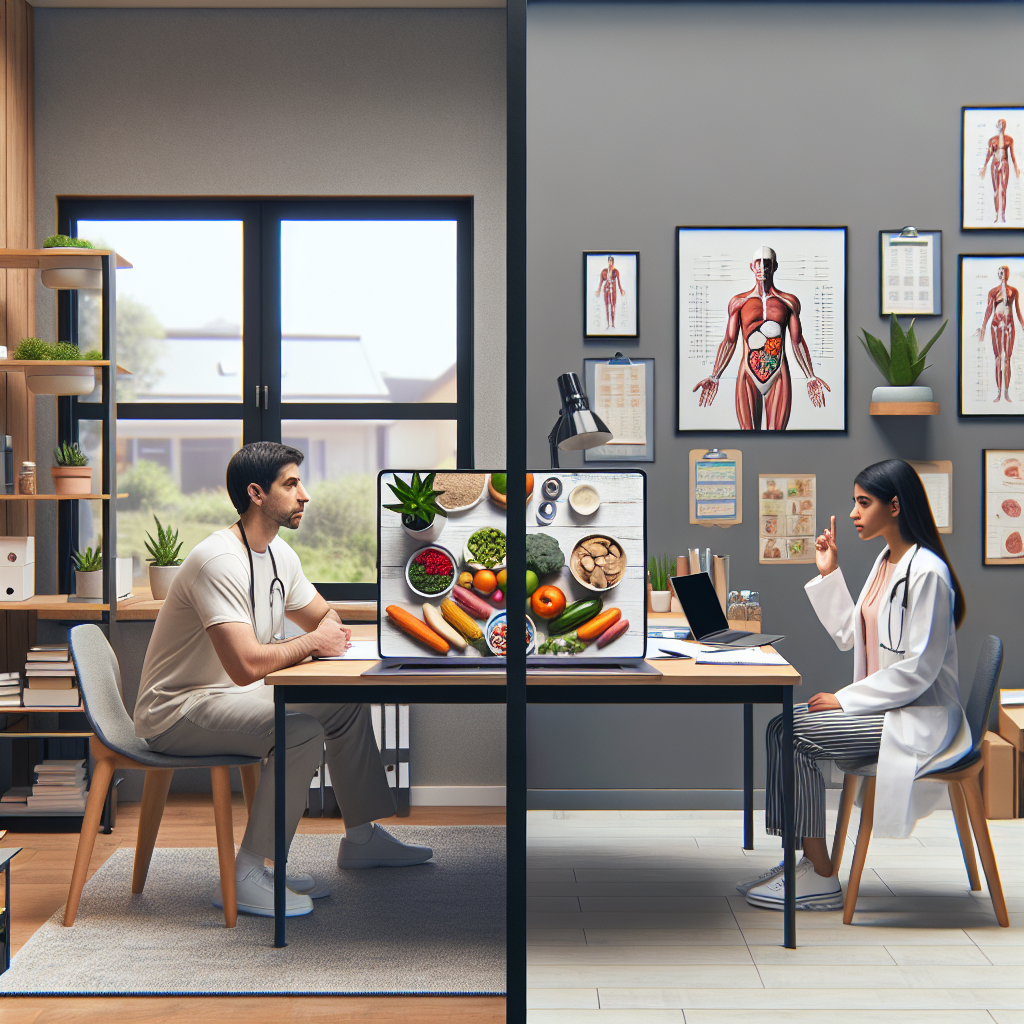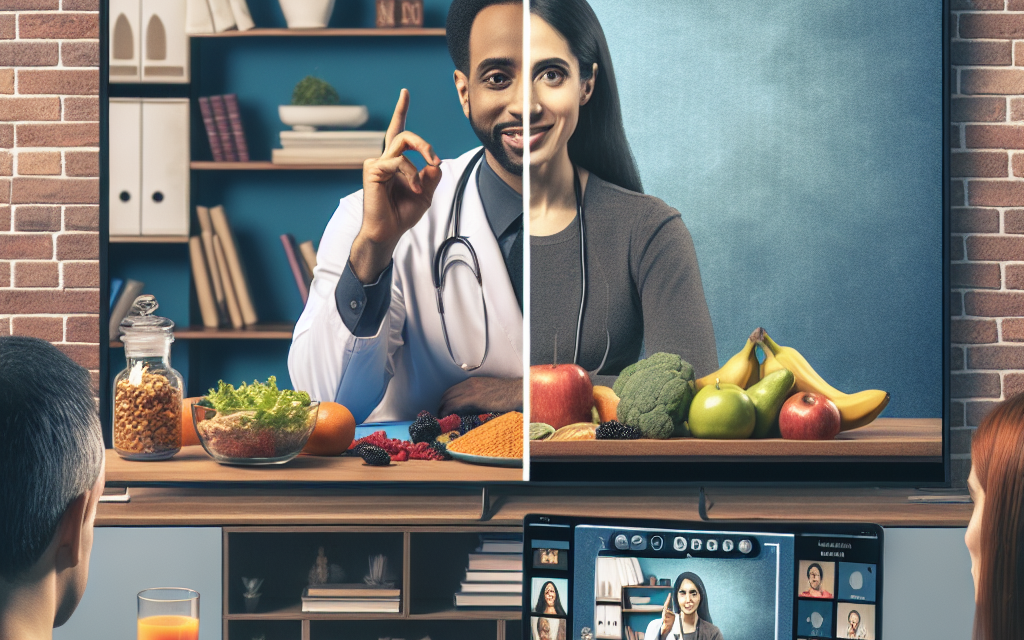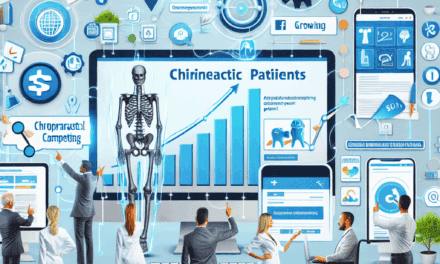Transforming Nutrition Counseling: The Impact of Telemedicine on Dietary Support

In recent years, the healthcare industry has witnessed a significant transformation with the advent of telemedicine. This digital revolution has not only reshaped the way medical consultations are conducted but has also extended its reach to various specialized fields, including nutrition counseling. As dietary habits play a crucial role in maintaining overall health and preventing chronic diseases, the integration of telemedicine into nutrition counseling has opened new avenues for providing effective dietary support. This article delves into the impact of telemedicine on nutrition counseling, exploring its benefits, challenges, and future prospects.
The Rise of Telemedicine in Nutrition Counseling
The integration of telemedicine into nutrition counseling has been a game-changer, offering a range of benefits that were previously unattainable through traditional methods. The rise of telemedicine in this field can be attributed to several factors, including technological advancements, increased internet accessibility, and the growing demand for personalized healthcare solutions.
Telemedicine has made it possible for individuals to access nutrition counseling from the comfort of their homes, eliminating geographical barriers and reducing the need for physical visits to healthcare facilities. This convenience has been particularly beneficial for individuals living in remote areas or those with mobility issues. Moreover, telemedicine platforms offer a variety of tools and resources that enhance the counseling experience, such as video consultations, digital food diaries, and personalized meal plans.
One of the key drivers behind the rise of telemedicine in nutrition counseling is the increasing prevalence of chronic diseases related to poor dietary habits. According to the World Health Organization, non-communicable diseases (NCDs) such as obesity, diabetes, and cardiovascular diseases are responsible for 71% of all deaths globally. Telemedicine provides an effective solution for addressing these issues by offering timely and personalized dietary support to individuals at risk.
Furthermore, the COVID-19 pandemic has accelerated the adoption of telemedicine across various healthcare sectors, including nutrition counseling. With social distancing measures in place and a heightened focus on health and wellness, more individuals have turned to telemedicine for dietary support. This shift has prompted healthcare providers to invest in telemedicine infrastructure and develop innovative solutions to meet the growing demand for virtual nutrition counseling.
Benefits of Telemedicine in Dietary Support
The integration of telemedicine into nutrition counseling offers numerous benefits that enhance the quality and accessibility of dietary support. These benefits extend to both healthcare providers and patients, making telemedicine an attractive option for delivering nutrition counseling services.
One of the primary benefits of telemedicine in dietary support is increased accessibility. Telemedicine platforms enable individuals to connect with nutritionists and dietitians from anywhere in the world, breaking down geographical barriers and expanding access to expert advice. This is particularly advantageous for individuals living in rural or underserved areas, where access to specialized healthcare services may be limited.
Telemedicine also offers greater flexibility in scheduling appointments, allowing patients to receive dietary support at times that are convenient for them. This flexibility is especially beneficial for individuals with busy schedules or those who require frequent follow-ups. Additionally, telemedicine reduces the need for travel, saving time and resources for both patients and healthcare providers.
Another significant benefit of telemedicine in dietary support is the ability to provide personalized and data-driven recommendations. Telemedicine platforms often incorporate digital tools such as food tracking apps, wearable devices, and online assessments, which enable nutritionists to gather detailed information about a patient’s dietary habits and health status. This data-driven approach allows for the development of tailored meal plans and interventions that address the unique needs and preferences of each individual.
Moreover, telemedicine facilitates continuous monitoring and support, which is crucial for achieving long-term dietary goals. Through regular virtual check-ins and real-time feedback, patients can stay motivated and accountable, leading to better adherence to dietary recommendations and improved health outcomes.
Challenges and Limitations of Telemedicine in Nutrition Counseling
While telemedicine offers numerous benefits for nutrition counseling, it also presents several challenges and limitations that need to be addressed to ensure its effectiveness. Understanding these challenges is essential for healthcare providers and policymakers to develop strategies that optimize the use of telemedicine in dietary support.
One of the primary challenges of telemedicine in nutrition counseling is the digital divide. Despite the widespread availability of internet access, there are still significant disparities in digital literacy and access to technology among different populations. Individuals from low-income backgrounds or older adults may face difficulties in using telemedicine platforms, limiting their ability to benefit from virtual nutrition counseling.
Another challenge is the potential for reduced patient engagement and rapport. In traditional face-to-face consultations, healthcare providers can build a strong rapport with patients through non-verbal cues and in-person interactions. However, virtual consultations may lack this personal touch, making it more challenging to establish trust and engage patients effectively. Healthcare providers need to develop strategies to overcome this barrier and ensure that patients feel comfortable and supported during virtual consultations.
Privacy and security concerns also pose a significant challenge for telemedicine in nutrition counseling. The transmission of sensitive health information over digital platforms raises concerns about data breaches and unauthorized access. Healthcare providers must implement robust security measures to protect patient data and comply with regulations such as the Health Insurance Portability and Accountability Act (HIPAA) in the United States.
Additionally, telemedicine may not be suitable for all types of nutrition counseling. Certain conditions or dietary interventions may require in-person assessments or physical examinations that cannot be conducted virtually. Healthcare providers need to assess the suitability of telemedicine for each patient and determine when in-person consultations are necessary.
Case Studies: Successful Implementation of Telemedicine in Nutrition Counseling
Several case studies highlight the successful implementation of telemedicine in nutrition counseling, demonstrating its potential to improve dietary support and health outcomes. These case studies provide valuable insights into the strategies and approaches that have been effective in leveraging telemedicine for nutrition counseling.
One notable case study is the implementation of a telemedicine-based nutrition counseling program for patients with type 2 diabetes. The program utilized a telemedicine platform to provide personalized dietary support and education to patients, with the goal of improving glycemic control and reducing the risk of complications. The program included regular virtual consultations with a registered dietitian, digital food tracking, and continuous glucose monitoring. The results showed significant improvements in patients’ HbA1c levels, weight management, and overall dietary adherence, highlighting the effectiveness of telemedicine in managing chronic conditions.
Another successful case study involved the use of telemedicine for weight management in a rural community. The program aimed to address the high prevalence of obesity in the community by providing accessible and personalized dietary support. Participants received virtual consultations with a nutritionist, along with access to an online platform that offered educational resources, meal planning tools, and support groups. The program resulted in significant weight loss among participants and improved their overall health and well-being.
In a different case study, telemedicine was used to provide nutrition counseling to pregnant women in underserved areas. The program aimed to improve maternal and fetal health outcomes by offering personalized dietary guidance and support throughout pregnancy. Participants received regular virtual consultations with a registered dietitian, along with access to an online platform that provided educational materials and resources. The program led to improved dietary habits among participants and positive pregnancy outcomes, demonstrating the potential of telemedicine to support maternal health.
These case studies highlight the diverse applications of telemedicine in nutrition counseling and underscore its potential to improve dietary support and health outcomes across different populations and settings.
Future Prospects and Innovations in Telemedicine for Nutrition Counseling
The future of telemedicine in nutrition counseling holds immense potential for innovation and growth. As technology continues to advance, new opportunities are emerging to enhance the delivery of dietary support and improve health outcomes. Several trends and innovations are shaping the future of telemedicine in nutrition counseling.
One promising trend is the integration of artificial intelligence (AI) and machine learning into telemedicine platforms. AI-powered tools can analyze large volumes of data to provide personalized dietary recommendations and predict health outcomes. For example, AI algorithms can analyze a patient’s dietary habits, health status, and genetic information to develop tailored meal plans that optimize nutritional intake and address specific health concerns.
Another innovation is the use of virtual reality (VR) and augmented reality (AR) in nutrition counseling. These technologies can create immersive and interactive experiences that enhance patient engagement and education. For example, VR simulations can help patients visualize portion sizes and understand the impact of their dietary choices on their health. AR applications can provide real-time feedback on food choices and portion sizes, helping patients make healthier decisions in their daily lives.
Telemedicine platforms are also increasingly incorporating social and community-based features to enhance patient support and motivation. Online support groups, forums, and social media integration can create a sense of community and accountability among patients, encouraging them to stay committed to their dietary goals. These features can also facilitate peer-to-peer learning and sharing of experiences, providing valuable insights and support to patients.
Furthermore, the integration of wearable devices and remote monitoring tools into telemedicine platforms is enhancing the ability to track and monitor patients’ dietary habits and health status. Wearable devices can collect real-time data on physical activity, sleep patterns, and biometric markers, providing valuable insights into a patient’s overall health and well-being. This data can be used to develop personalized interventions and track progress over time.
As telemedicine continues to evolve, it is essential for healthcare providers, policymakers, and technology developers to collaborate and address the challenges and limitations associated with its use in nutrition counseling. By leveraging the latest technological advancements and adopting innovative approaches, telemedicine has the potential to transform the delivery of dietary support and improve health outcomes for individuals worldwide.
Conclusion
The integration of telemedicine into nutrition counseling has revolutionized the way dietary support is delivered, offering numerous benefits such as increased accessibility, flexibility, and personalized care. While challenges such as the digital divide, patient engagement, and privacy concerns exist, successful case studies demonstrate the potential of telemedicine to improve health outcomes across diverse populations.
As technology continues to advance, the future of telemedicine in nutrition counseling holds immense promise, with innovations such as AI, VR, and wearable devices enhancing the delivery of dietary support. By addressing existing challenges and embracing new opportunities, telemedicine has the potential to transform nutrition counseling and contribute to better health outcomes for individuals worldwide.
In conclusion, telemedicine is poised to play a pivotal role in the future of nutrition counseling, offering a powerful tool for addressing the growing burden of diet-related chronic diseases and promoting healthier lifestyles. As healthcare providers and policymakers continue to explore and implement telemedicine solutions, the potential for improving dietary support and health outcomes is vast and promising.





